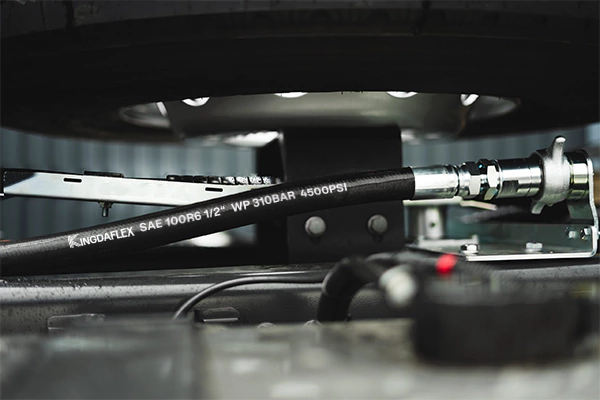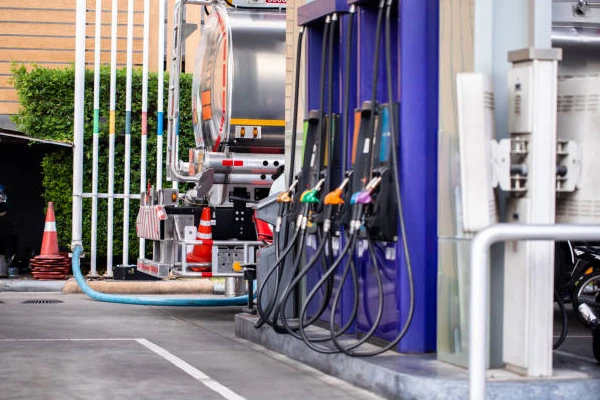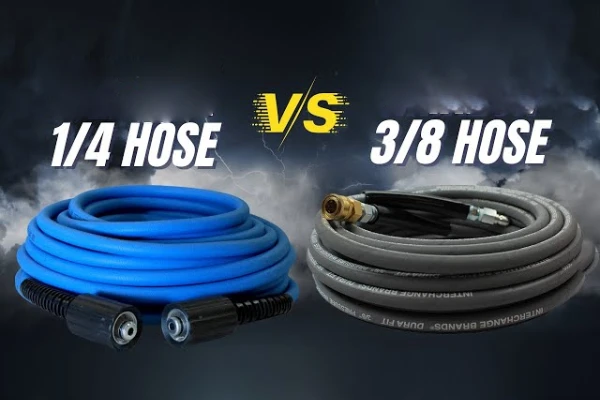Rubber hoses and vinyl hoses are two of the most common types of hoses used in industrial, automotive, and household applications. Each material offers unique properties that influence durability, flexibility, and suitability for different tasks, making it essential to understand their differences before choosing the right hose for your needs.
Rubber hoses are known for their flexibility, strength, and resistance to extreme temperatures and abrasion. Vinyl hoses, on the other hand, are lightweight, cost-effective, and resistant to corrosion, but may lack durability under heavy-duty conditions. Knowing the characteristics, advantages, and limitations of each type helps in selecting the best option for specific applications.
What are Rubber Hoses?
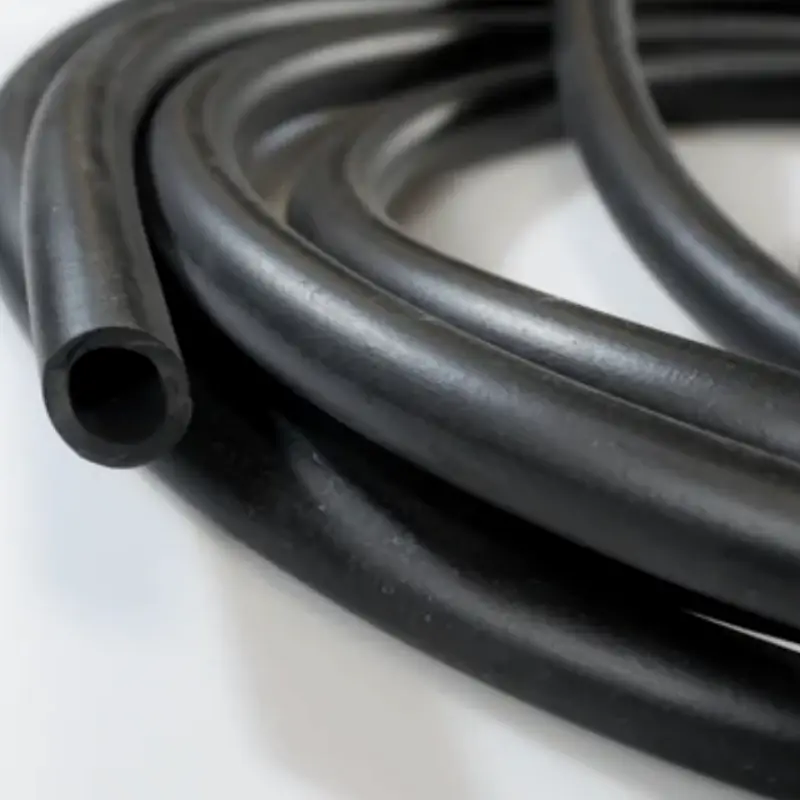
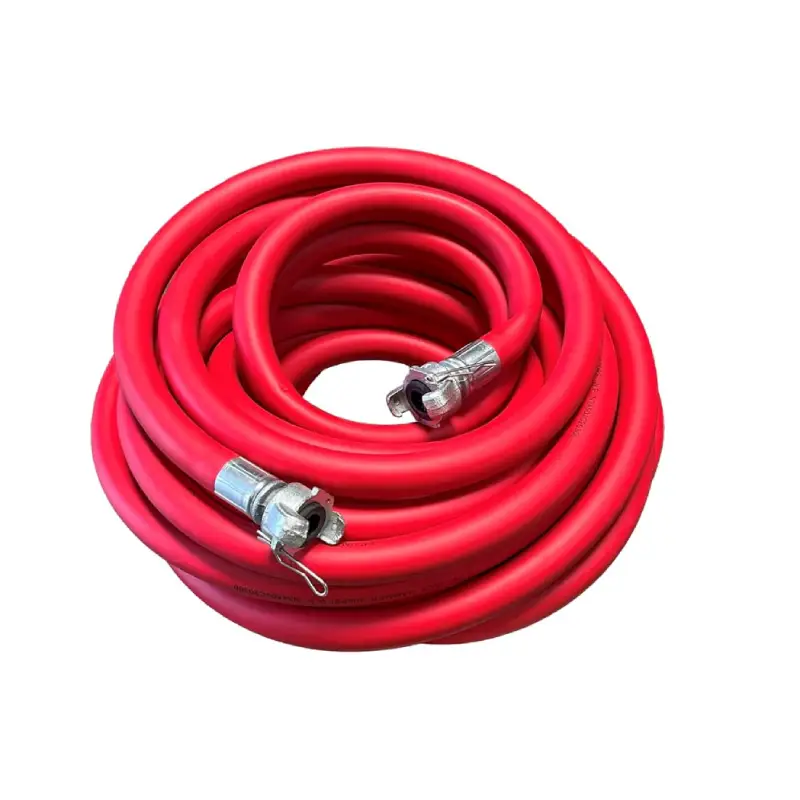
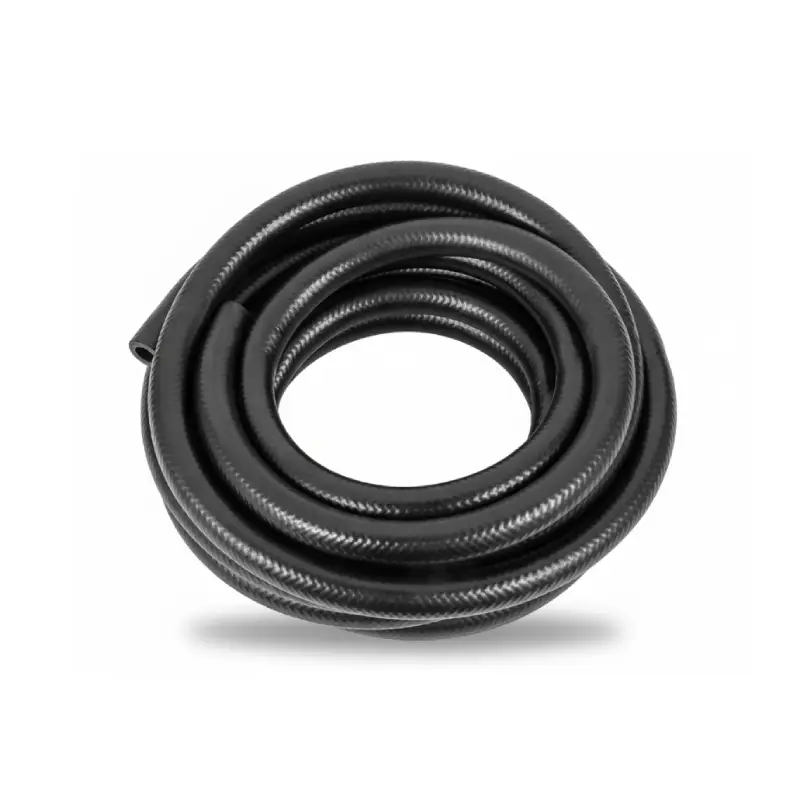
Rubber hoses are flexible tubes made from natural or synthetic rubber, designed to transport liquids, gases, or air in various industrial, commercial, and household applications. They are valued for their durability, elasticity, resistance to abrasion, and ability to withstand high pressures and temperatures.
- Automotive Applications: Rubber hoses are widely used in vehicles for fuel lines, brake systems, and coolant transport. Their flexibility and heat resistance make them ideal for engine components, ensuring smooth fluid flow and reliable performance even under extreme temperature fluctuations, pressure, and vibration.
- Industrial Applications: In industrial settings, rubber hoses are employed to convey chemicals, water, air, and oils. Their strength and resistance to wear and corrosion make them suitable for factories, construction sites, and manufacturing processes where durability and safety are critical.
- Agricultural Applications: Rubber hoses are used in irrigation, spraying pesticides, and water transfer on farms. Their ability to withstand outdoor conditions, sunlight, and varying pressures ensures efficient fluid delivery, reduces maintenance, and supports sustainable agricultural operations.
- Household Applications: Rubber hoses serve in garden watering, home plumbing, and appliance connections. Their flexibility, ease of handling, and resistance to kinks and leaks make them practical for daily use, providing reliable water flow and convenience in domestic settings.
What are Vinyl Hoses?
Vinyl hoses are lightweight, flexible tubes made from polyvinyl chloride (PVC). Known for their affordability and resistance to corrosion, they are widely used in household, commercial, and light industrial applications. Their durability against water, mild chemicals, and sunlight makes them a popular choice for everyday tasks.
- Gardening and Watering: Vinyl hoses are ideal for watering plants, lawns, and gardens. Their lightweight nature allows easy maneuverability, while the material resists kinking and cracking under normal outdoor conditions. These hoses provide reliable water flow for household and commercial gardening tasks, offering convenience and efficiency.
- Domestic Cleaning Applications: Used for washing cars, patios, and windows, vinyl hoses handle moderate water pressure without damage. Their flexibility and lightweight design make them easy to store and use. Vinyl hoses are perfect for routine cleaning tasks, combining ease of handling with sufficient durability for regular home use.
- Light Industrial Uses: In industries, vinyl hoses serve for low-pressure water transport and conveying mild chemicals. They are used in workshops, laboratories, and small-scale production environments where lightweight and corrosion-resistant hoses are required. Their affordability and ease of replacement make them practical for cost-conscious operations.
- Food and Beverage Applications: Certain food-grade vinyl hoses are designed for transferring water, beverages, and other non-hazardous liquids safely. They comply with hygiene standards and are resistant to mild acids and alkalines, making them suitable for kitchens, breweries, and food processing tasks, where safe liquid transfer is essential.
Rubber Hose vs Vinyl
Rubber hoses and vinyl hoses differ significantly in material properties, performance, and applications. Understanding these differences helps in selecting the right hose for specific tasks, whether for industrial, automotive, or household use. Here are key aspects to consider when comparing these two hose types.
Flexibility
Rubber hoses are highly flexible and can bend easily without kinking. This makes them ideal for applications requiring frequent movement or tight spaces, such as automotive engines and industrial machinery connections. The flexibility ensures durability and consistent water or fluid flow under varying conditions.
Vinyl hoses are moderately flexible but stiffer than rubber hoses, especially under cold temperatures. While they are lightweight and easy to maneuver for everyday tasks like gardening, repeated bending may cause cracks or kinks over time, limiting their long-term flexibility for heavy-duty applications.
Durability and Longevity
Rubber hoses are extremely durable, resistant to abrasion, and can handle high pressures and extreme temperatures. They maintain integrity over years of use, making them suitable for industrial, automotive, and commercial applications where reliability is critical under harsh conditions.
Vinyl hoses are less durable and more prone to cracking or damage under extreme heat, cold, or heavy use. They are better suited for light-duty applications and short-term use, such as household gardening or cleaning tasks, where exposure to harsh conditions is minimal.
Weight
Rubber hoses are generally heavier due to the dense material, which adds strength but can make handling slightly more cumbersome, particularly for large or long hoses. This weight is offset by their superior durability and ability to handle high-pressure applications.
Vinyl hoses are lightweight, making them easy to carry, store, and maneuver around the home or garden. This advantage makes them popular for everyday tasks, though their light weight corresponds to lower resistance to pressure and impact compared to rubber hoses.
Chemical and Weather Resistance
Rubber hoses are highly resistant to chemicals, UV rays, and ozone, allowing them to perform well outdoors and in industrial environments. They maintain structural integrity even when exposed to oils, fuels, or harsh weather conditions.
Vinyl hoses resist mild chemicals and corrosion but degrade faster under prolonged sun exposure or harsh weather. They are suitable for water transport and light cleaning but are not recommended for chemical handling or prolonged outdoor use in extreme climates.
Cost and Maintenance
Rubber hoses are more expensive due to their durability and performance benefits. They require minimal maintenance but are a long-term investment, especially for industrial or heavy-duty applications. Their higher cost is justified by longevity and reliability.
Vinyl hoses are cost-effective and widely available, making them a practical choice for budget-conscious users. They may require replacement more often due to cracking or wear, but their initial low cost makes them ideal for light-duty or occasional use.
Here’s a comparison table summarizing the differences between rubber hoses and vinyl hoses:
| Aspect | Rubber Hose | Vinyl Hose |
|---|---|---|
| Flexibility | Highly flexible, resists kinking, ideal for tight spaces | Moderately flexible, stiffer in cold temperatures, may kink over time |
| Durability & Longevity | Extremely durable, resistant to abrasion, high pressure, and extreme temperatures | Less durable, prone to cracking, suitable for light-duty and short-term use |
| Weight | Heavier, strong and robust for industrial use | Lightweight, easy to handle, suitable for gardening and household tasks |
| Chemical & Weather Resistance | Resistant to chemicals, UV, ozone; suitable for outdoor/industrial use | Resists mild chemicals, degrades faster under sun and harsh weather |
| Cost & Maintenance | Higher cost, long-term investment, minimal maintenance | Cost-effective, easier to replace, suitable for occasional use |
Vinyl vs Rubber Garden Hose
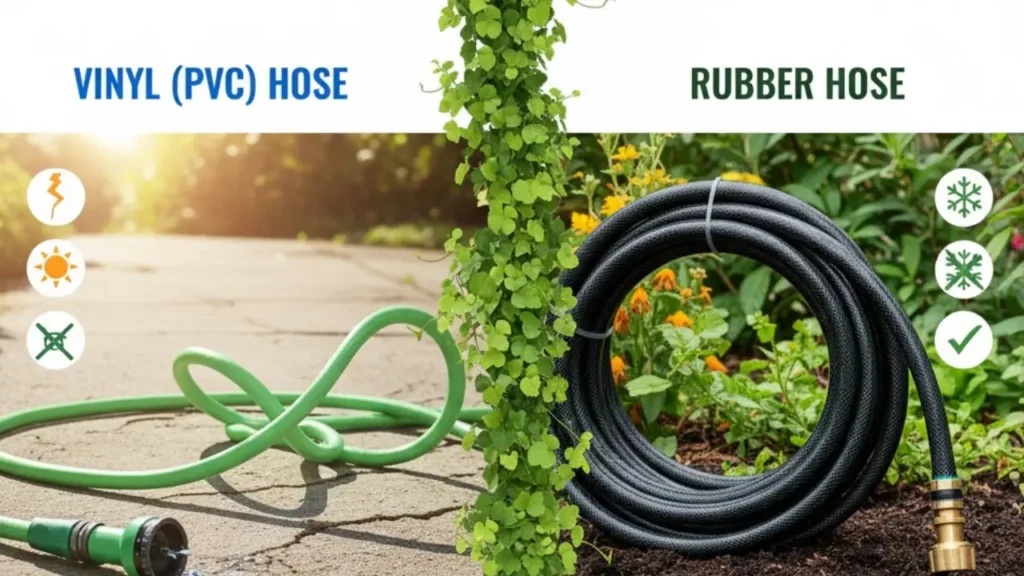
Choosing the right material for your garden hose impacts durability, weight, and usability. We break down the key differences between Vinyl and Rubber hoses to help you select the best option for your specific watering and outdoor needs, considering both cost and performance.
Material Composition
Vinyl hoses, often referred to as PVC (polyvinyl chloride) hoses, are typically made from plastic resin and can be reinforced with a mesh or fiber web to improve burst strength. While lightweight, they are generally the least durable option. In contrast, rubber hoses are made from synthetic or natural rubber compounds, which gives them a higher elasticity and inherent strength, making them heavier but substantially more rugged.
Weight and Handling
Rubber hoses are noticeably heavier than vinyl hoses, especially in longer lengths, which can make coiling, carrying, and maneuvering them more difficult for some users. Vinyl hoses are much lighter, making them easier to handle and store. However, this lighter weight can also make them more prone to kinking and tangling during use, demanding more attention during unwinding.
Kink Resistance
Vinyl hoses are notorious for kinking easily, especially in hot weather when the material softens or when subjected to tight bends. Once kinked, water flow is immediately restricted. Rubber hoses offer superior kink resistance due to their thicker walls and robust, flexible nature, meaning they are less likely to tangle or interrupt water flow during use.
Durability and Lifespan
Rubber hoses boast superior durability and a significantly longer lifespan, often lasting several years longer than vinyl. They are highly resistant to abrasion, crushing, and weathering, including cracking from prolonged UV exposure. Vinyl hoses are more susceptible to wear and tear, developing cracks and pinholes over time, particularly where they rub against surfaces.
Temperature Tolerance
Rubber hoses perform better across a wider range of temperatures; they remain flexible in cold weather and resist softening and bursting under high pressure in the heat. Vinyl hoses tend to stiffen in the cold, making them hard to coil, and can easily melt or become overly pliable and prone to leaks in intense summer heat.
Here is a table showing the differences between vinyl and rubber garden hoses:
| Aspect | Vinyl (PVC) Hose | Rubber Hose |
| Durability/Lifespan | Lower; prone to cracking and wear | Higher; excellent resistance to abrasion and UV |
| Weight | Very lightweight; easy to handle and carry | Heavy; more difficult to maneuver and coil |
| Kink Resistance | Poor; kinks easily, especially in hot weather | Excellent; highly resistant to kinking and tangling |
| Temperature Range | Poor in extremes; stiffens in cold, softens in heat | Excellent; remains flexible in cold and stable in heat |
| Cost | Typically the most affordable option | Generally more expensive upfront |
How to Choose Rubber Hoses and Vinyl Hoses?
Selecting the right hose is essential for ensuring durability, safety, and efficiency. Factors like application type, pressure requirements, chemical exposure, temperature range, and budget determine whether a rubber hose or a vinyl hose is the best choice for your specific needs.
- Identify the Application: Determine whether the hose will be used for gardening, cleaning, automotive, or industrial purposes. Rubber hoses are ideal for heavy-duty or high-pressure applications, while vinyl hoses are better suited for light-duty or household tasks. Matching the hose to its purpose ensures optimal performance.
- Consider Pressure Requirements: High-pressure applications require hoses that can withstand significant force. Rubber hoses typically handle higher pressures and maintain integrity under stress, making them ideal for industrial and automotive use. Vinyl hoses are suitable for low to moderate pressures, commonly found in domestic or light-duty applications.
- Evaluate Chemical and Temperature Resistance: If the hose will be exposed to chemicals, oils, or extreme temperatures, rubber hoses are preferable due to their superior resistance. Vinyl hoses resist mild chemicals and moderate temperatures but may degrade under harsh conditions. Understanding environmental exposure helps prevent damage and prolongs hose life.
- Assess Flexibility and Handling: Consider how frequently the hose will need to bend, move, or be stored. Rubber hoses offer excellent flexibility and resistance to kinking, ideal for dynamic or tight-space environments. Vinyl hoses are lightweight and easy to handle but can become stiff or crack in cold weather.
- Factor in Cost and Maintenance: Budget constraints often influence hose selection. Rubber hoses are more expensive but provide long-term durability, reducing replacement frequency. Vinyl hoses are cost-effective for short-term or light-duty use, but may require more frequent replacement. Balancing cost with expected lifespan ensures a smart investment.
Conclusion
Choosing between rubber and vinyl hoses depends on the intended application, environmental conditions, and budget considerations. Rubber hoses offer superior durability and flexibility for demanding tasks, while vinyl hoses are ideal for light-duty and cost-sensitive uses. Understanding these differences ensures optimal performance and longevity.
When selecting a hose, factors such as pressure rating, chemical compatibility, and temperature tolerance should be considered. Rubber hoses excel in high-stress industrial settings, whereas vinyl hoses perform well for domestic and garden use. Proper selection reduces maintenance costs and prevents failures, improving overall efficiency.
For high-quality wholesale rubber hoses, trust Kingdaflex to provide reliable, durable, and versatile solutions. Our products are designed for industrial, automotive, and commercial applications, ensuring consistent performance, long life, and excellent value. Partnering with Kingdaflex guarantees access to top-grade hoses for every need.


